Private securityPrivate contractors outnumber government security two to one
A recent survey found that the number of private security contractors outnumber police officers two to one around the world; in some countries, the difference between private security contractors and law enforcement officials is even more significant; the report also noted several critical emerging issues as a result of the increasing use of private contractors including oversight, the role of government, and concerns for public safety

Private security contractors drill in responding to attack // Source: uruknet.com
A recent survey found that the number of private security contractors outnumber police officers two to one around the world.
In some countries, the difference between private security contractors and law enforcement officials is even more significant. For instance, according to the Small Arms Survey, conducted by researchers at the Graduate Institute of Geneva, India is home to seven million private security personal compared to one million police officers, while in Guatemala there are 120,000 private security contractors compared to 20,000 police officers.
Using data compiled from regional industry reports, media reports, and academic articles, researchers concluded that there were 19.5 million private security personnel in seventy countries around the world, which suggests that global demand for security exceeds what governments can provide.
The recent increase in private security contractors has been driven primarily by — government cutbacks that have resulted in the hiring of private security to fulfill core security functions like immigration enforcement, prison surveillance, and airport security.
The report added that contractors can be “hired and fired faster than uniformed personnel and can therefore be deployed more flexibly, which is more affordable in the long run than maintaining a permanent in-house capability.” Changes to government policy has also spurred demand with more militaries like the United States hiring contractors for maintenance and training to allow troops to focus on combat troops.
The report noted several critical emerging issues as a result of the increasing use of private contractors including oversight, the role of government, and concerns for public safety.
Researchers were concerned that privatizing security could result in a bifurcation of safety between social classes. “One of the principal concerns regarding the private security sector is that, like other commercial service, only those who are able and willing to pay will benefit from it,” stated the report.
Meanwhile countries are still grappling with the very notion of private contractors and many question if their jobs should be performed by government agents. For instance the CIA has come under pressure for hiring Blackwater, a private security firm, to conduct targeted kinetic operations on members of al Qaeda.
Of particular concern was the general lack of regulations, vetting, and oversight of private contractors. Regulatory frameworks have not kept pace with the rapid surge in demand, resulting in potential abuse or other dangerous consequences. So far no clear doctrine has emerged that outlines the use of weapons and force and there are few mechanisms that prevent people with criminal histories from being hired. An investigation found that 30 percent of the employees at a private security firm in Tanzania had criminal backgrounds.
Moreover oversight becomes difficult to enforce internationally. In Iraq, the United States simultaneously hired private contractors and oversaw them resulting in a conflict of interest. The contractors were granted immunity from Iraqi law and as a result the report found that many abuses went un-prosecuted.
The report concludes that these issues will need to be resolved as the use of private contractors will likely increase in the coming years. To help remedy the situation, the report recommends increasing transparency, establishing clearer regulations, and the creation of international standards.
